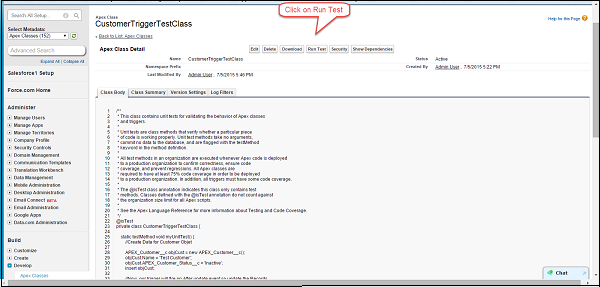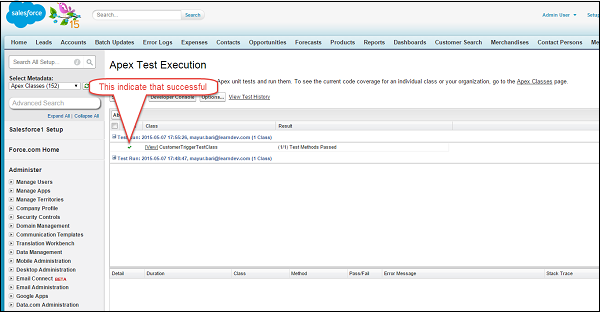
- Apex - Home
- Apex - Overview
- Apex - Environment
- Apex - Example
- Apex - Data Types
- Apex - Variables
- Apex - Strings
- Apex - Arrays
- Apex - Constants
- Apex - Decision Making
- Apex - Loops
- Apex - Collections
- Apex - Classes
- Apex - Methods
- Apex - Objects
- Apex - Interfaces
- Apex - DML
- Apex - Database Methods
- Apex - SOSL
- Apex - SOQL
- Apex - Security
- Apex - Invoking
- Apex - Triggers
- Apex - Trigger Design Patterns
- Apex - Governer Limits
- Apex - Batch Processing
- Apex - Debugging
- Apex - Testing
- Apex - Deployment
Apex - Testing
Testing is the integrated part of Apex or any other application development. In Apex, we have separate test classes to develop for all the unit testing.
Test Classes
In SFDC, the code must have 75% code coverage in order to be deployed to Production. This code coverage is performed by the test classes. Test classes are the code snippets which test the functionality of other Apex class.
Let us write a test class for one of our codes which we have written previously. We will write test class to cover our Trigger and Helper class code. Below is the trigger and helper class which needs to be covered.
// Trigger with Helper Class
trigger Customer_After_Insert on APEX_Customer__c (after update) {
CustomerTriggerHelper.createInvoiceRecords(Trigger.new, trigger.oldMap);
//Trigger calls the helper class and does not have any code in Trigger
}
// Helper Class:
public class CustomerTriggerHelper {
public static void createInvoiceRecords (List<apex_customer__c>
customerList, Map<id, apex_customer__c> oldMapCustomer) {
List<apex_invoice__c> InvoiceList = new List<apex_invoice__c>();
for (APEX_Customer__c objCustomer: customerList) {
if (objCustomer.APEX_Customer_Status__c == 'Active' &&
oldMapCustomer.get(objCustomer.id).APEX_Customer_Status__c == 'Inactive') {
// condition to check the old value and new value
APEX_Invoice__c objInvoice = new APEX_Invoice__c();
objInvoice.APEX_Status__c = 'Pending';
objInvoice.APEX_Customer__c = objCustomer.id;
InvoiceList.add(objInvoice);
}
}
insert InvoiceList; // DML to insert the Invoice List in SFDC
}
}
Creating Test Class
In this section, we will understand how to create a Test Class.
Data Creation
We need to create data for test class in our test class itself. Test class by default does not have access to organization data but if you set @isTest(seeAllData = true), then it will have the access to organization's data as well.
@isTest annotation
By using this annotation, you declared that this is a test class and it will not be counted against the organization's total code limit.
testMethod keyword
Unit test methods are the methods which do not take arguments, commit no data to the database, send no emails, and are declared with the testMethod keyword or the isTest annotation in the method definition. Also, test methods must be defined in test classes, that is, classes annotated with isTest.
We have used the 'myUnitTest' test method in our examples.
Test.startTest() and Test.stopTest()
These are the standard test methods which are available for test classes. These methods contain the event or action for which we will be simulating our test. Like in this example, we will test our trigger and helper class to simulate the fire trigger by updating the records as we have done to start and stop block. This also provides separate governor limit to the code which is in start and stop block.
System.assert()
This method checks the desired output with the actual. In this case, we are expecting an Invoice record to be inserted so we added assert to check the same.
Example
/**
* This class contains unit tests for validating the behavior of Apex classes
* and triggers.
*
* Unit tests are class methods that verify whether a particular piece
* of code is working properly. Unit test methods take no arguments,
* commit no data to the database, and are flagged with the testMethod
* keyword in the method definition.
*
* All test methods in an organization are executed whenever Apex code is deployed
* to a production organization to confirm correctness, ensure code
* coverage, and prevent regressions. All Apex classes are
* required to have at least 75% code coverage in order to be deployed
* to a production organization. In addition, all triggers must have some code coverage.
*
* The @isTest class annotation indicates this class only contains test
* methods. Classes defined with the @isTest annotation do not count against
* the organization size limit for all Apex scripts.
*
* See the Apex Language Reference for more information about Testing and Code Coverage.
*/
@isTest
private class CustomerTriggerTestClass {
static testMethod void myUnitTest() {
//Create Data for Customer Objet
APEX_Customer__c objCust = new APEX_Customer__c();
objCust.Name = 'Test Customer';
objCust.APEX_Customer_Status__c = 'Inactive';
insert objCust;
// Now, our trigger will fire on After update event so update the Records
Test.startTest(); // Starts the scope of test
objCust.APEX_Customer_Status__c = 'Active';
update objCust;
Test.stopTest(); // Ends the scope of test
// Now check if it is giving desired results using system.assert
// Statement.New invoice should be created
List<apex_invoice__c> invList = [SELECT Id, APEX_Customer__c FROM
APEX_Invoice__c WHERE APEX_Customer__c = :objCust.id];
system.assertEquals(1,invList.size());
// Check if one record is created in Invoivce sObject
}
}
Running the Test Class
Follow the steps given below to run the test class −
Step 1 − Go to Apex classes ⇒ click on the class name 'CustomerTriggerTestClass'.
Step 2 − Click on Run Test button as shown.

Step 3 − Check status

Step 4 − Now check the class and trigger for which we have written the test
Class

Trigger

Our testing is successful and completed.